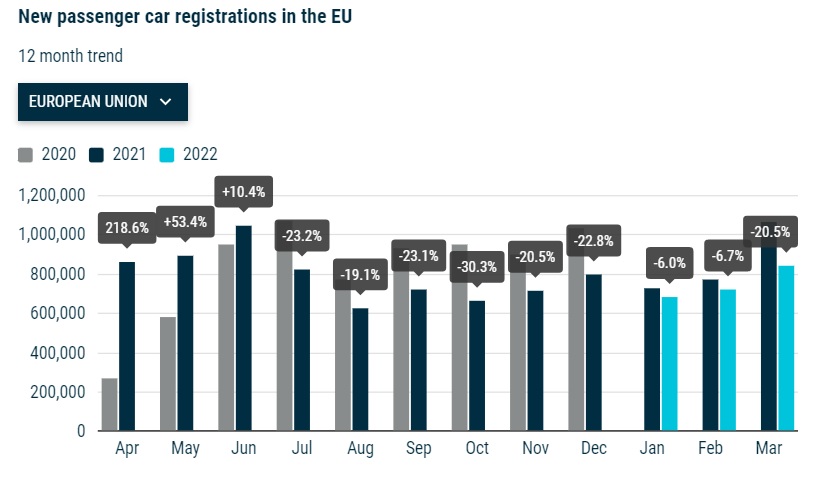Thessaloniki gets ready for its metro launch in November
The underground rapid transit lines have been under construction for almost two decades due to various project delays
 TheMayor.EU logo
TheMayor.EU logo Inflation, semiconductor shortage and the war in Ukraine have contributed to the overall drop
According to a report by the European Automobile Manufacturers’ Association, or ACEA, passenger car sales in the European Union have fallen for the ninth consecutive month, with a steep decline of 20% in March, compared to the same period in 2021. Most countries in the region recorded double-digit drops, including the four key markets of Spain (-30.2%), Italy (-29.7%), France (-19.5%) and Germany (-17.5%).
The ACEA explains the overall decline in sales with the plethora of crises battering the EU’s markets in the last year. Here is a list: a health crisis, a semiconductor shortage, high inflation and the war in Ukraine, as well as a refugee crisis.
 One of the biggest drops in sales was around
One of the biggest drops in sales was around
the first lockdown in the spring of 2020, Source: ACEA
The Russian invasion of Ukraine has further disrupted supply deliveries, which has forced both Volkswagen AG and BMW AG to temporarily halt production. Apart from rising prices, according to the ACEA, shortages will dent the forecast recovery of the market as bottlenecks on semiconductors are now seen reaching well into next year.
The slump in new registrations, however, is not evenly distributed as some countries even saw a rise in sales compared to the same March last year. Some of the biggest increases were in Ireland, Romania and Bulgaria, which each saw a rise of about a third.
At the same time, some EU countries have seen an even sharper drop than that in the four key players, most notably Sweden, Denmark and Slovenia, where new registrations nearly halved.
All the while, across the EU both local and national governments have launched all kinds of measures to entice people to leave their fossil-fuelled vehicles behind and switch to more sustainable modes of transportation: public transport, bicycles, electric cars.
Measures range from the city of Brussels offering up to 900 euros for every citizen who cancels their car registration, with the money aimed at funding a bike or public transport pass, to the Austrian city of Graz turning all one-way streets into cycling lanes, to Hamburg building massive cycling expressways, and to municipalities installing hundreds of charging stations for electric cars.
According to the report from the ACEA, the sharpest drop in new car registrations in the EU happened in the first half of 2020, corresponding to the first lockdown. The data shows that in 2021, sales were up by more than two times and they continued to go up, peaking in June 2020, March 2021 and June 2021.
Concurrently, bike sales have increased. According to data published by Statista, in 2020, these rose by 10%, bringing them up to 22 million registered sales for the year. For comparison, in 2020, the EU saw only 11,634,409 new car registrations.

The underground rapid transit lines have been under construction for almost two decades due to various project delays

Now you can get your wine in Talence by paying directly in Bitcoin

That’s because the state has to spend money on updating the railway infrastructure rather than subsidizing the cost of the popular pass

Rethinking renewable energy sources for the urban landscape

The examples, compiled by Beyond Fossil Fuels, can inform and inspire communities and entrepreneurs that still feel trepidation at the prospect of energy transition

Now you can get your wine in Talence by paying directly in Bitcoin

The 10th European Conference on Sustainable Cities and Towns (ESCT) sets the stage for stronger cooperation between the EU, national and local level to fast track Europe's transition to climate neutrality.

At least, that’s the promise made by the mayor of Paris, Anne Hidalgo

The underground rapid transit lines have been under construction for almost two decades due to various project delays

At least, that’s the promise made by the mayor of Paris, Anne Hidalgo

Hostal de Pinós is located in the geographical centre of the autonomous region

Despite its church-y name, the district has long been known as the hangout spot for the artsy crowds

Urban dwellers across the EU are having a say in making their surroundings friendlier to people and the environment.

Forests in the EU can help green the European construction industry and bolster a continent-wide push for architectural improvements.

Apply by 10 November and do your part for the transformation of European public spaces

An interview with the Mayor of a Polish city that seeks to reinvent itself

An interview with the newly elected ICLEI President and Mayor of Malmö

A conversation with the Mayor of Lisbon about the spirit and dimensions of innovation present in the Portuguese capital














